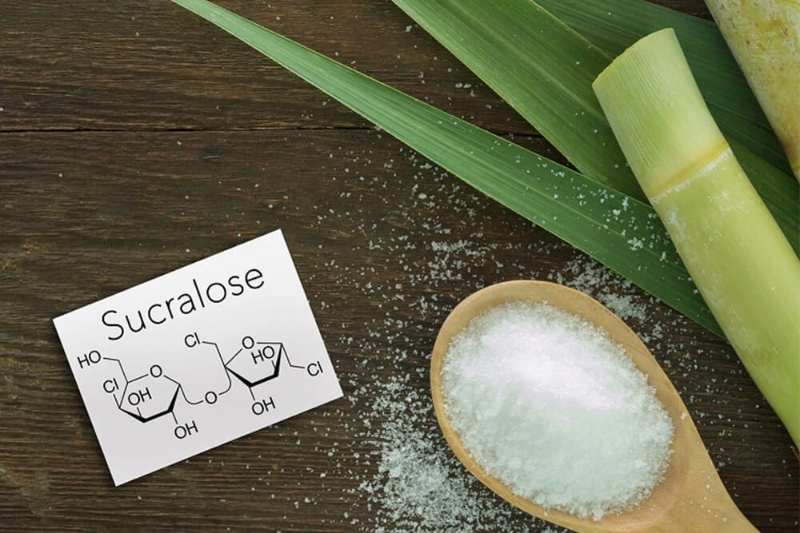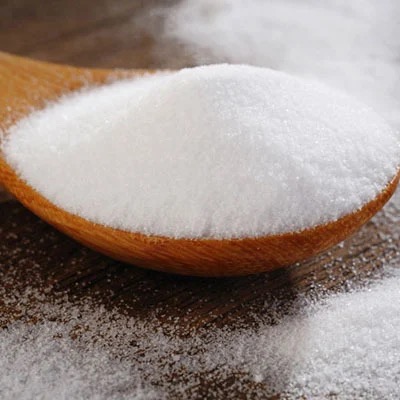Views: 222 Author: Sara Publish Time: 2025-07-16 Origin: Site








Content Menu
● Can You Be Allergic to Sucralose?
>> The Rarity of Sucralose Allergy
>> Understanding the Difference Between Allergy and Sensitivity
● Symptoms of Sucralose Allergy
● Sucralose Intolerance vs. Allergy
● How Does Sucralose Cause Symptoms?
● Sucralose in Healthcare Products
● Long-Term Effects of Sucralose Allergy or Intolerance
● Managing Sucralose Allergy or Intolerance
● The Role of Manufacturers and OEM/ODM Providers
● FAQ
>> 1. Can sucralose cause severe allergic reactions like anaphylaxis?
>> 2. What are common symptoms of sucralose intolerance?
>> 3. Is sucralose allergy more common than sugar allergy?
>> 4. How can I identify if a product contains sucralose?
>> 5. Can sucralose cause headaches or migraines?
Sucralose is a widely used artificial sweetener found in many food, beverage, and healthcare products. As a factory in China specializing in natural sweeteners, functional polyols, and dietary fibers, providing OEM/ODM services for international manufacturers, understanding consumer concerns about sucralose, especially allergies, is crucial. This article explores whether people can be allergic to sucralose, symptoms, long-term effects, and management, supported by scientific insights and real-world cases.

Sucralose is a zero-calorie artificial sweetener derived from sucrose by replacing three hydroxyl groups with chlorine atoms. It is approximately 600 times sweeter than sugar and is widely used in beverages, baked goods, dairy products, and pharmaceuticals due to its stability and sweetness profile. Unlike many other artificial sweeteners, sucralose is heat-stable, making it suitable for cooking and baking, which further increases its popularity in the food industry.
Sucralose's widespread use in the food, beverage, and healthcare sectors stems from its ability to provide sweetness without calories, making it an attractive ingredient for products aimed at weight management and diabetic consumers. It is also favored because it does not promote tooth decay, which is why it is often found in oral hygiene products such as toothpaste and mouthwash.
True allergies to sucralose are extremely rare. Unlike natural sugars, sucralose's chemical structure makes an IgE-mediated allergic reaction unlikely. Most reports of adverse reactions are anecdotal or involve intolerance rather than true allergy.
However, some individuals do report immediate hypersensitivity-like symptoms after consuming sucralose-containing products, suggesting that while rare, allergic reactions can occur. These reactions may be due to individual immune system sensitivities or possibly due to other ingredients in the product rather than sucralose itself.
It is important to clarify the difference between an allergy and a sensitivity or intolerance. An allergy involves the immune system and can cause severe reactions, including anaphylaxis. Sensitivity or intolerance, on the other hand, does not involve the immune system and usually causes milder symptoms such as digestive discomfort or headaches.
Because sucralose is a synthetic compound, the body's immune system is less likely to recognize it as an allergen compared to natural proteins. However, some people may still experience adverse reactions due to other factors such as gut microbiome changes or individual biochemical responses.
People who are allergic or sensitive to sucralose may experience a range of symptoms, which can include:
- Skin reactions: Hives, itching, eczema, and red, bumpy rashes. These symptoms often appear shortly after consumption and can be localized or spread across the body.
- Gastrointestinal symptoms: Nausea, abdominal pain, diarrhea, and bloating. These symptoms may arise due to sucralose's impact on gut bacteria or intestinal fermentation.
- Headaches and migraines: Some individuals report headaches or migraines triggered by sucralose consumption. The exact mechanism is unclear but may involve changes in blood flow or neurotransmitter activity.
- Respiratory symptoms: Coughing, wheezing, shortness of breath, or throat tightness in rare cases. These symptoms are more typical of allergic reactions and require immediate medical attention.
- Severe reactions: Though extremely rare, anaphylaxis has been reported, requiring immediate medical attention. This life-threatening condition involves swelling, difficulty breathing, and a drop in blood pressure.
A person with a sucralose allergy described developing itchy skin and hives after consuming a small amount of Doritos containing sucralose. Other products like protein powders, Tylenol tablets, mouthwash, and toothpaste have also triggered symptoms for some sensitive individuals. These cases highlight the importance of awareness about hidden sources of sucralose in everyday products.
It is important to distinguish between allergy and intolerance:
| Aspect | Sucralose Allergy | Sucralose Intolerance |
|---|---|---|
| Immune system involved | Yes, IgE-mediated response possible | No, non-immune digestive sensitivity |
| Symptoms | Hives, swelling, respiratory distress | Bloating, diarrhea, headaches, nausea |
| Severity | Can be severe (anaphylaxis in rare cases) | Generally mild to moderate gastrointestinal |
| Frequency | Very rare | More common |
Most people who experience adverse effects from sucralose likely have intolerance rather than a true allergy. Intolerance symptoms are often dose-dependent, meaning small amounts may be tolerated without issue, while larger quantities trigger symptoms.
Sucralose is mostly not metabolized by the body and passes through the digestive tract. In some sensitive individuals, it may alter gut bacteria or ferment in the intestines, causing gastrointestinal distress like diarrhea or bloating. Research suggests that sucralose can affect the composition of gut microbiota, potentially leading to digestive symptoms in susceptible individuals.
Some headaches or migraines may be triggered by sucralose due to individual sensitivity or secondary effects like dehydration or stress. The exact biochemical pathways are not fully understood, but it is thought that sucralose might influence neurotransmitter release or vascular responses in the brain.
Emerging research has raised questions about the impact of sucralose on gut microbiota. The gut microbiome plays a crucial role in digestion, immune function, and overall health. Some studies have shown that sucralose consumption can reduce the number of beneficial bacteria in the gut, potentially leading to digestive issues or impaired immune responses.
For individuals with pre-existing gut conditions such as irritable bowel syndrome (IBS) or inflammatory bowel disease (IBD), sucralose may exacerbate symptoms. Therefore, those with sensitive digestive systems should monitor their response to sucralose-containing products carefully.

Sucralose is not only used in food and beverages but also in healthcare products like tablets, syrups, toothpaste, and mouthwash. For people with sucralose allergy or intolerance, these products can be hidden sources of exposure.
For example, some over-the-counter medications use sucralose as a sweetener to improve taste. Toothpaste and mouthwash often contain sucralose to provide sweetness without promoting cavities. Awareness of these sources is important for managing symptoms effectively.
Long-term effects are not well documented due to the rarity of true allergies. However, ongoing exposure in sensitive individuals may lead to chronic skin issues, digestive discomfort, or frequent headaches. Persistent inflammation caused by allergic reactions can also increase the risk of secondary infections or skin damage.
For those with intolerance, chronic digestive symptoms can affect nutrient absorption and overall quality of life. It is advisable for individuals experiencing ongoing symptoms to seek medical advice and consider dietary adjustments.
- Avoidance: The most effective way to manage symptoms is to avoid sucralose-containing products. This includes reading labels carefully and being aware of less obvious sources.
- Label reading: Sucralose is often found in unexpected products, including medications and oral care items. Checking ingredient lists is essential.
- Medical consultation: For suspected allergy, consult an allergist for testing and diagnosis. Skin prick tests or oral food challenges may be used to confirm allergy.
- Symptom relief: Antihistamines for skin reactions, hydration for headaches, and digestive aids for gastrointestinal symptoms may help. In severe cases, carrying an epinephrine auto-injector is recommended.
- Alternative sweeteners: For those sensitive to sucralose, natural sweeteners like stevia, monk fruit, or erythritol may be better tolerated.
As a manufacturer specializing in natural sweeteners, functional polyols, and dietary fibers, understanding consumer concerns about sucralose allergy and intolerance is vital. Providing clear labeling, offering alternative sweetener blends, and educating clients about potential sensitivities can enhance product safety and consumer trust.
Developing customized blends that minimize or eliminate sucralose while maintaining sweetness and functionality is a valuable service for international manufacturers seeking to cater to sensitive populations.
While sucralose is generally considered safe and non-allergenic for the vast majority of people, allergic reactions, though very rare, can occur. Symptoms range from mild skin irritation to severe respiratory distress. More commonly, individuals experience intolerance symptoms such as gastrointestinal upset and headaches. Awareness and proper management, including avoidance and medical consultation, are key for those sensitive to sucralose. As a manufacturer specializing in natural sweeteners and health solutions, understanding these nuances helps in developing safer, consumer-friendly products for the global market.

Yes, although extremely rare, sucralose can cause anaphylaxis, a life-threatening allergic reaction requiring immediate medical attention.
Common symptoms include bloating, diarrhea, headaches, nausea, and stomach pain.
No, both sucralose and sugar allergies are very rare. However, sucralose intolerance may be more frequently reported than sugar intolerance.
Check ingredient labels for "sucralose" or brand names like Splenda. Sucralose is also found in some medications, toothpaste, and mouthwash.
Yes, some individuals report headaches or migraines triggered by sucralose, possibly due to individual sensitivity or dehydration.
Top Nutritional Supplement Manufacturers And Suppliers in Indonesia
Top Nutritional Supplement Manufacturers And Suppliers in India
Top Nutritional Supplement Manufacturers And Suppliers in Germany
Top Nutritional Supplement Manufacturers And Suppliers in France
Top Nutritional Supplement Manufacturers And Suppliers in Canada
